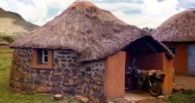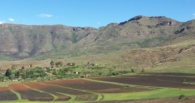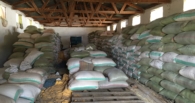A night and day in Zimbabwe
Stephen Turner
2 April 2014
/
- 0 Comments
In probably my shortest field mission so far, I recently spent two nights and three days in Botswana and Zimbabwe, scoping some proposed work on enhancing rural infrastructure. I had at least expected to spend the two nights in the same bed, but arrived in Kasane (northern Botswana) to be told that we would leave in a few hours for neighbouring Zimbabwe and sleep at Victoria Falls before a day’s field work that would bring us back across the Botswana border in the evening.
I think I had been out of Zimbabwe for 12 years. Crossing the border from Botswana, a few minutes’ drive from Kasane, was less bureaucratic than I feared. Apparently the nearby crossing of the Zambezi into Zambia is a lot more tedious if you have a vehicle with you. Much discussion of easing border crossings within the Southern African Development Community seems to have led to very little so far.
My last visit to the country had also been to Victoria Falls, for a conference of the International Association for the Study of the Commons that was held in big tents in the grounds of a hotel just outside town, with warthogs showing an interest in quite a few of the papers being presented. This year I found the town little changed, outwardly at least. I didn’t even see the Falls, although I could hear them thundering a mile down the road from the immaculate, recently refurbished, three star hotel where I spent my Zimbabwean night. The country’s hospitality industry seemed as professional as ever. The hotel on which so much money had been spent was almost empty. Despite the fresh paint and fittings, one could still trace its probable history as an establishment for middle-income Rhodesians who couldn’t afford the Victoria Falls Hotel or similar affluent establishments down the road.
This was my first experience of using US dollars for everything in a country that is not America. (It’s awkward that only the bank notes are used. Transactions worth less than a dollar are done in South African Rand.) Especially as we moved into the rural areas – and handed over a one dollar bill at a minor road toll – the use of a currency from a distant and very different land seemed strange – not so much the use of the dollars, but the knowledge that there was no domestic alternative.
Whole forests have been felled to feed the academic literature on Zimbabwe’s Communal Areas Management Programme for Integrated Resources (CAMPFIRE) over the last 25 years. At first it was the leading driver of the enthusiastic spread of the concept of community-based natural resource management (CBNRM) across southern Africa, showing how rural people could benefit from wildlife conservation by receiving part of the revenue from controlled commercial hunting and other tourist activities. The Rural District Councils played a central and sometimes controversial role in the receipt and management of CAMPFIRE revenues. Having used up quite a few trees myself with writings on CBNRM, I was interested at last to visit the offices of one of these Councils. Mention of CAMPFIRE there and in the villages mostly led to sheepish looks. The programme has lost its momentum and now leaves the Zimbabweans I met completely underwhelmed.
In the villages that we visited I was struck, as I always have been, by Zimbabweans’ fluency in English. I was reminded of one basic reason for this in a primary school where, as is standard practice, all the instruction was in that language. I was struck, too, by the complete poverty of the institution, where many children sat on the floor in classrooms that not only lacked furniture but had also lost their doors. Nevertheless, the school and its grounds were as neat and tidy as the teachers and children could make them.
Rural livelihoods seemed pervaded by poverty too, with minimal incomes, low agricultural production and little functioning infrastructure – including clean water supplies (or any water supplies), which is what our visit focused on. Changes in land use patterns seem to have brought wildlife from the nearby Hwange National Park closer to some communities, with lion attacks on livestock more common and frequent damage to crops by elephants and other animals. Meanwhile, a chief we met showed us the letter of award he had received from government, transferring title to a former commercial safari lodge on state land near the park to him. Apparently a leader with some real commitment to the sustainable development of his community, he discussed with us his plans to develop it into a venture that his people would staff and profit from. A different kind of CAMPFIRE, perhaps.
Many in and around Mokoro know Zimbabwe far better than I. I hope they will forgive these amateur comments. But I imagine they share the feeling I had as I crossed back to spend the following night in Kasane: for all it has been through, Zimbabwe remains a beautiful country with a strong and capable people.
You must be logged in to post a comment.



